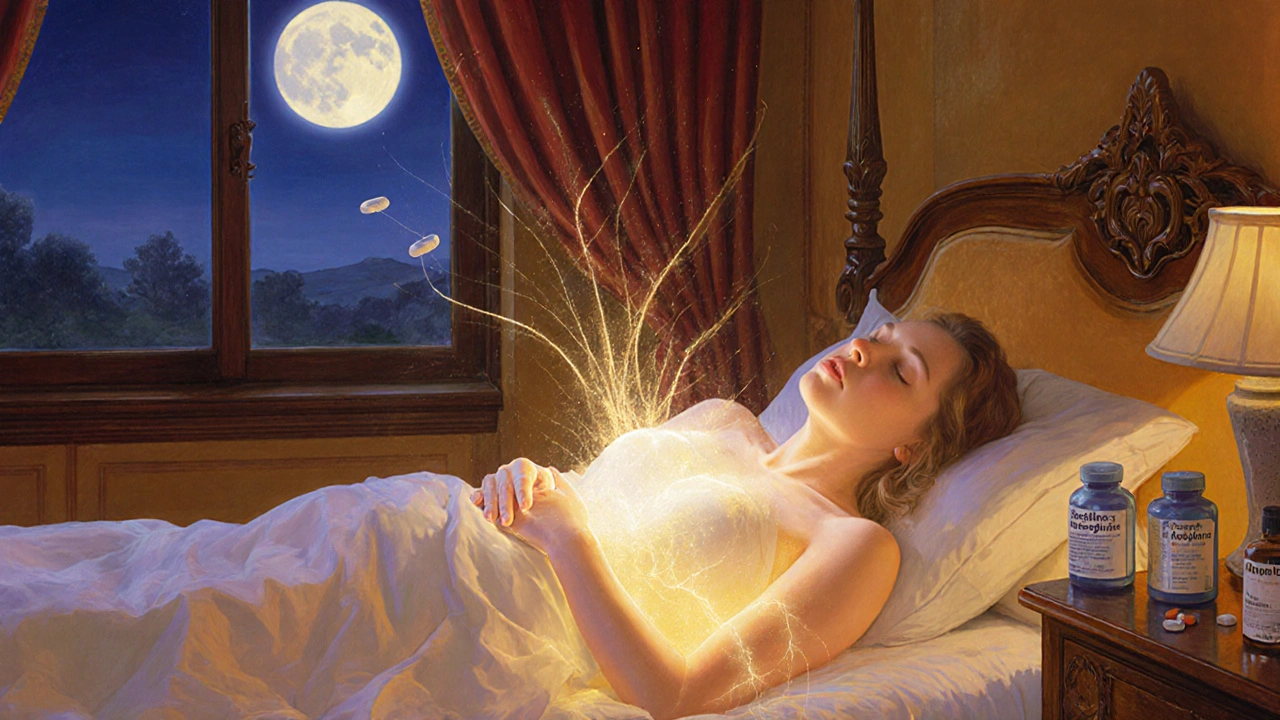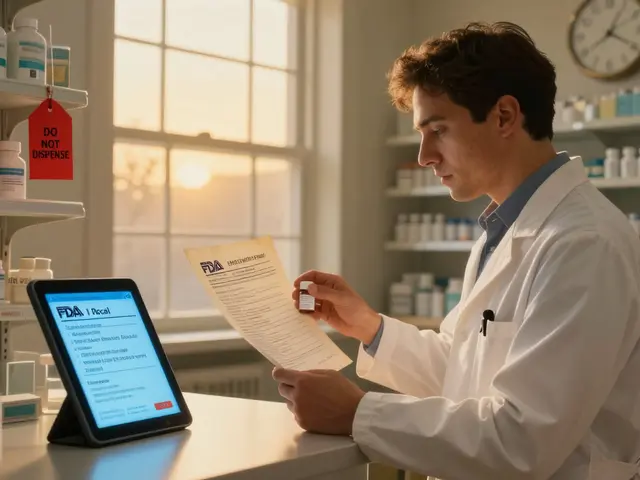Drug-Induced Itching Assessment Tool
Determine if your itching is likely caused by a medication. This tool asks key questions from the article to help identify the connection between your symptoms and medications.
Assessment Questions
Your Risk Assessment
Itching isn’t just a nuisance-it can wreck your sleep, ruin your day, and even make you want to quit a medication you need. If you’ve started a new drug and suddenly can’t stop scratching, you’re not alone. Drug-induced pruritus, or itching caused by medications, affects 1-2% of people taking certain drugs, and it’s far more common than most doctors admit. It’s not always a rash or hives. Sometimes, it’s just relentless, deep itching with no visible sign on the skin. And for some, it doesn’t go away until the drug is stopped-or sometimes, even after that.
Which Medications Cause Itching?
Itching can come from almost any type of medicine, but some are far more likely to trigger it. The big culprits include:- Antibiotics like penicillin, amoxicillin, and trimethoprim-sulfamethoxazole
- Statins (atorvastatin, simvastatin) used for cholesterol
- ACE inhibitors and ARBs (lisinopril, losartan) for high blood pressure
- Calcium channel blockers like amlodipine
- Opioids such as morphine, codeine, and fentanyl-especially after spinal injections
- Antidepressants, especially tricyclics like amitriptyline
- Antimalarials like chloroquine
- Antihistamines like cetirizine and levocetirizine-yes, even the ones meant to stop itching
A study from Johns Hopkins analyzing over a million patients found that heparin caused itching in 1.11% of users, trimethoprim-sulfamethoxazole in 1.06%, and calcium channel blockers in 0.92%. That might sound low, but when you’re one of those people, it’s everything.
And here’s something surprising: women are 70% more likely to experience drug-induced itching than men. Black patients are also more than twice as likely to develop it compared to white patients. This isn’t random-it points to biological and genetic differences in how skin and nerves respond to certain drugs.
Why Does a Pill Make You Itch?
Most people assume itching from medication is an allergic reaction. But it’s not always. There are two main ways drugs cause itching:- Pharmacological: The drug directly triggers nerve endings or chemicals in your skin. Opioids, for example, bind to receptors in your spinal cord and brain that release histamine-this is why up to 90% of people get itchy after spinal morphine. Statins can dry out your skin. Some drugs cause mild liver stress, leading to bile buildup that irritates nerves.
- Immunological: Your immune system reacts to the drug as a foreign invader. This can cause true allergies, like hives or swelling, but sometimes it just shows up as itching without any rash.
Here’s the twist: if antihistamines like Benadryl or Zyrtec don’t help, it’s probably not histamine causing the itch. That means you’re dealing with a non-histaminergic pathway-something deeper, involving serotonin, opioids, or other nerve signals. This is why some people keep scratching even after taking pills meant to stop it.
The Hidden Danger: Antihistamine Withdrawal Itching
This one catches even doctors off guard. If you’ve been taking cetirizine (Zyrtec) or levocetirizine (Xyzal) for months or years, stopping suddenly can trigger severe itching within 1-5 days. The FDA confirmed 209 cases between 2017 and 2023. In 92% of those cases, people had been on the drug for more than 3 months-some for over 20 years.What happens? Your body gets used to the drug blocking histamine. When you stop, histamine surges back harder than before. The result? Intense, widespread itching that can last for weeks. Some patients reported hospitalization, disability, or even thoughts of self-harm.
Here’s the key insight: restarting the antihistamine resolves itching in 90% of cases. But if you try to taper off after restarting, only 38% of people find relief. That means if you want to get off Zyrtec or Xyzal, you can’t just quit cold turkey. You need a plan.

How to Know If Your Itching Is From a Drug
There’s no blood test or scan for drug-induced pruritus. Diagnosis comes down to timing and elimination.Ask yourself:
- When did the itching start? Did it begin within days or weeks of starting a new medication?
- Did it get worse after a dose increase?
- Did it improve after stopping the drug? (Even if you didn’t mean to stop it.)
- Does it come back if you restart the drug?
If you answered yes to any of these, the drug is likely the cause. The FDA found that 87% of reported cases came from patients themselves-not doctors. That means you’re your own best detective. Keep a symptom journal: write down every pill you take, when you started it, and when the itching began or worsened.
What to Do When Medication Makes You Itch
The first step is never to panic. Don’t stop your meds without talking to your doctor-especially if it’s for blood pressure, heart disease, or depression. But here’s what you can do right now:- Moisturize daily. Dry skin makes itching worse. Use fragrance-free creams like CeraVe or Vanicream after showers.
- Cool it down. Cold showers, damp cloths, or aloe vera gel can calm nerve signals. Avoid hot water-it strips your skin and makes itching worse.
- Try topical capsaicin. This chili-derived cream (like Capsaicin 0.025%) depletes substance P, a chemical that tells nerves to itch. It burns at first, but after a few days, it helps.
- Switch antihistamines. If you’re on cetirizine and itchy, try diphenhydramine (Benadryl) or hydroxyzine. They work differently and might help.
- Ask about antidepressants. Low-dose doxepin or amitriptyline can block itch signals in the brain. Studies show they work even when antihistamines fail.
- For opioid-induced itching: Your doctor might add nalmefene or butorphanol to block the itch pathway without reducing pain relief.
If the itching is severe, your doctor might consider switching your medication. For example, if you’re on lisinopril and itchy, switching to a calcium channel blocker like amlodipine might help. If statins are the problem, switching from simvastatin to rosuvastatin or reducing the dose can cut itching in half.
When to Call Your Doctor
Not all itching needs emergency care. But call your provider if:- The itching lasts more than two weeks without a clear cause
- You develop hives, swelling, or trouble breathing
- You’re on a medication for a chronic condition and want to stop it
- It’s disrupting your sleep or causing you to scratch until you bleed
- You’re trying to stop an antihistamine like Zyrtec and it’s unbearable
Don’t wait. The longer you ignore it, the harder it is to fix. And remember: your pharmacist can help too. They see your full medication list and can spot hidden interactions or timing patterns you might miss.
What’s Next for Drug-Induced Itching?
Research is finally catching up. Scientists now know that itching isn’t just one thing-it’s a network of nerve signals, immune triggers, and chemical pathways. That’s why antihistamines don’t always work. New drugs targeting non-histamine pathways (like those involving IL-31 or TSLP) are in early trials. In the next 5 years, we may see medications designed specifically for drug-induced pruritus.For now, the best tool is awareness. If you’ve been on a medication for more than 3 months and suddenly start itching, don’t brush it off. It’s not just "dry skin." It’s your body telling you something’s off. Talk to your doctor. Track your symptoms. And don’t be afraid to ask: "Could this pill be making me itch?"
Can antihistamines cause itching instead of stopping it?
Yes. Long-term use of antihistamines like cetirizine (Zyrtec) or levocetirizine (Xyzal) can lead to rebound itching when you stop them. This isn’t an allergy-it’s your body overcompensating after being blocked from histamine for months or years. The FDA confirmed this in 2023, with 92% of cases occurring after use longer than 3 months. Restarting the drug usually fixes it within days.
Why does itching from statins happen more in some people?
Statins can dry out your skin and interfere with cholesterol metabolism in skin cells. People with naturally drier skin or genetic differences in how their liver processes these drugs are more likely to react. Studies show Black patients report statin-induced itching at higher rates, possibly due to variations in skin barrier function and drug metabolism.
Is it safe to stop a medication just because it’s causing itching?
No-not without medical advice. Stopping blood pressure, heart, or antidepressant meds suddenly can be dangerous. Instead, work with your doctor to find alternatives. For example, switching from lisinopril to a calcium channel blocker, or from simvastatin to rosuvastatin, often reduces itching without losing the drug’s benefits.
Can topical creams help with drug-induced itching?
Yes, but not all. Moisturizers and cool compresses help with dryness. Capsaicin cream (0.025%) is effective for nerve-related itching because it depletes the itch-signaling chemical substance P. Steroid creams work if there’s secondary skin inflammation, but they won’t fix itching caused by internal drug effects.
How long does drug-induced itching last after stopping the medication?
It depends on the drug. For most, itching fades within days to weeks after stopping. But for hydroxyethyl starch (used in IV fluids), itching can last up to 15 months. Antihistamine withdrawal itching usually lasts 1-4 weeks. If it persists beyond 6 weeks, other causes-like liver issues or nerve disorders-should be checked.
Should I avoid all medications that list itching as a side effect?
No. Itching is listed as a side effect for many safe, effective drugs because it’s common enough to be documented-not because it’s dangerous for everyone. For most people, the benefit outweighs the risk. Only if you personally experience itching should you consider alternatives. Many people take statins or ACE inhibitors for years with no itching at all.







Comments
Eric Healy
18 November 2025I got itchy as hell on lisinopril. Thought it was dry skin. Turned out my doctor didn't even know this was a thing. Took me 3 months to connect the dots. Now I'm on amlodipine and no more scratching. Why do docs ignore this?
Shannon Hale
19 November 2025Oh my GOD this is the most IMPORTANT post I’ve read in years. I’ve been on Zyrtec for 17 years and when I stopped it I thought I was dying. My skin was ON FIRE. I cried for a week. My dermatologist laughed at me. The FDA finally admitted it? Took them long enough. I’m not crazy. I’m just a victim of Big Pharma’s silence.
Elia DOnald Maluleke
21 November 2025The human body, in its intricate wisdom, does not err without reason. When a pill induces pruritus, it is not merely a side effect-it is a signal. A whisper from the soma, pleading for recalibration. To dismiss this as trivial is to ignore the ancient covenant between chemistry and consciousness. We treat symptoms, not systems. And in doing so, we become the architects of our own suffering.
satya pradeep
22 November 2025Bro i had this exact issue with simvastatin. Was scratching so bad i slept with gloves on. Switched to rosuvastatin and boom-gone. Also noticed black folks i know on statins complain way more. Not coincidence. Pharma needs to stop acting like its just 'dry skin'.
Prem Hungry
23 November 2025Dear friend, I commend your diligence in documenting this critical health insight. As a medical professional with over two decades of clinical experience, I urge you to maintain a symptom journal and consult with a pharmacist before altering any regimen. Your awareness is a powerful tool in an era of medical neglect.
Leslie Douglas-Churchwell
24 November 2025This is all a lie. The FDA is owned by Pfizer. Zyrtec was designed to make you dependent so they can sell you more drugs. The itching? That’s the body’s immune system fighting the nanobots in the pills. They’ve been putting them in meds since 2010 to track us. I’ve been off all meds since 2018. My skin is flawless. 🌿👁️💊
shubham seth
25 November 2025So let me get this straight. You’re telling me people get itchy from the same pills they take to live? And the solution is to switch to another pill? That’s not medicine, that’s Russian roulette with a pharmacy label. Statins cause itching? Cool. What’s the next one? Heart meds make you hallucinate? Antidepressants give you tinnitus? We’re not treating disease-we’re just playing whack-a-mole with side effects.
Kathryn Ware
27 November 2025I just want to say thank you for writing this. I’ve been dealing with opioid-induced itching after my back surgery and no one took me seriously. I tried everything-Benadryl, aloe, cold showers-and nothing worked. Then my pain doc suggested nalmefene and it was like a switch flipped. 🙏 I wish I’d known this sooner. You’re not alone. And this info? It’s life-changing. Thank you for sharing it so clearly.
kora ortiz
28 November 2025This is exactly why you need to listen to your body. No test can replace your own experience. If something feels off-trust it. Don’t wait for a doctor to validate your pain. You’re the expert on your own skin. Keep tracking. Keep speaking up. You’re not being dramatic-you’re being brave.
Jeremy Hernandez
30 November 2025Lmao another 'I'm a doctor' post. So you're telling me if I'm itchy on a statin I should just switch to another statin? What if THAT one makes me itch too? Then what? We just keep swapping pills until we die from something else? This whole system is broken. Doctors don't know shit. They just push more chemicals.
Tarryne Rolle
30 November 2025The real issue isn’t the itching. It’s that we’ve outsourced our bodily intuition to pharmaceutical labels. We don’t trust our skin anymore-we trust the tiny print on a bottle. And when the body screams, we call it a 'side effect' and reach for another pill. The itch is a rebellion. We’ve forgotten how to listen.